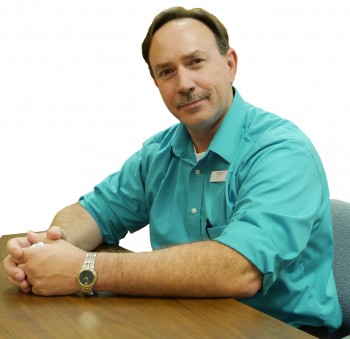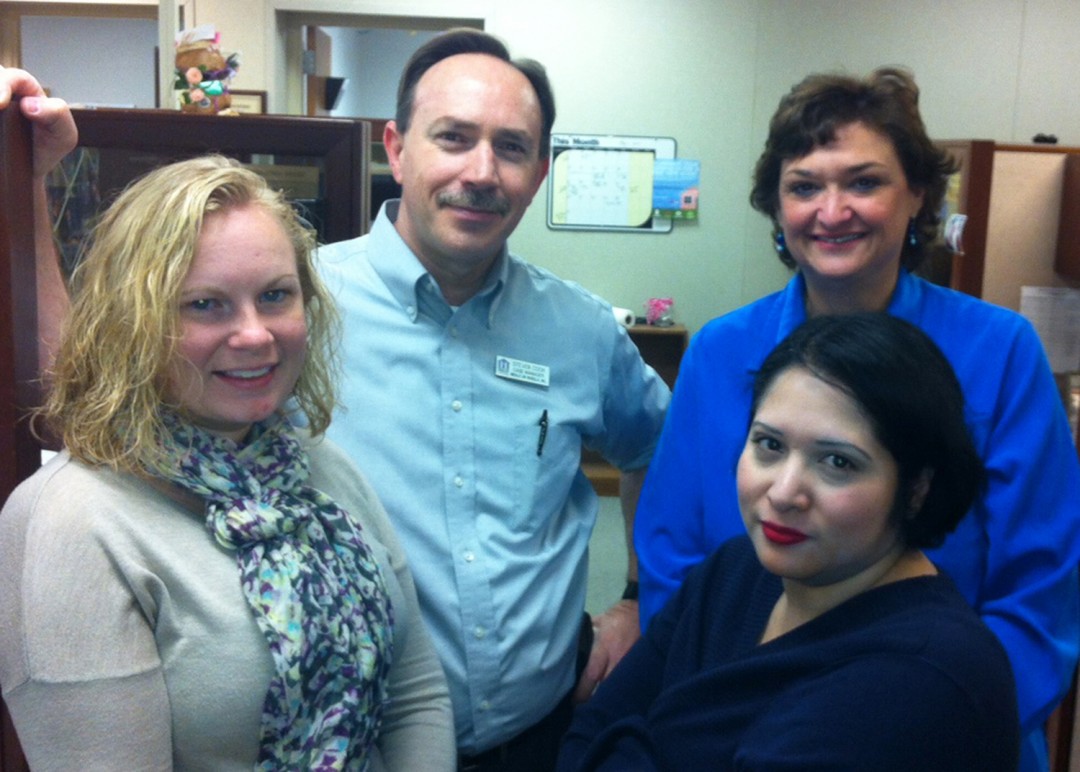
Meals On Wheels Case Manager, Steven Cook
By Keith Harrison
“You never know what the day will bring,” Steve said, leaning back in his chair as he takes a bite of his salad. “I hope you don’t mind me eating lunch while we talk.” Of course I did not mind. Some of my best conversations have taken place over lunch with a mouth full of food. I was happy that I was able to grab a few minutes with him in one of those rare times when he is actually in the office. Steven Cook has been a case manager at Meals On Wheels of Tarrant County for 10 years.
Along with the volunteers who deliver our meals, case managers are the face of the agency. They are the folks who meet with potential clients to determine eligibility, make quarterly check-up visits with existing clients to gauge their progress, and advocate for other services within the community.
Steve’s day usually begins with a stop in the office at 6:30 a.m. to schedule the day’s activities. He prioritizes intake calls – referrals from people who are inquiring about our services – to ensure that those who need our help get it as quickly as possible. “When you’re hungry, you can’t wait weeks for someone to return your call,” Steve said. “You need help right now.” That is one of the first things that I learned about Steve when I met him a little over a year ago. This is not just a job to him. It is a mission and in many ways, a ministry to those in need.
Home-delivered meals are available to anyone who is homebound for any length of time, is physically or mentally unable to prepare a meal for themselves, and has no one to help them on a regular basis. “The initial part of the intake process involves a phone call to determine need,” Steve explained to me. “I start with questions, such as, ‘Do you drive?’ and ‘How many people live with you?’ Being a case manager involves a lot of detective work.
That initial phone call is our opportunity to assess their cognitive and physical ability. Sometimes, people have a need, such as not being able to pay their electric bill. That’s not really the focus of what we do, but that doesn’t detract from the fact that these people are struggling to make ends meet.” Since Meals On Wheels works closely with a number of other charitable organizations, we can make referrals to other resources within the community.
If Steve determines that the person on the phone is a candidate for our services, he schedules an in-home visit with them that day. “I had two intakes this morning,” Steve says. “The first lady has cancer and only has about a year to live. The second person is an elderly man who recently lost his right leg due to diabetes. He has poor vision and a number of other health concerns. They both desperately need our assistance. Yesterday, I worked with an 82-year-old man who has severe arthritis. He had fallen and hurt his back. He was having difficulty preparing his meals, so he started ordering food from Amazon. It’s amazing, but he was spending all of his money simply to have something to eat.”
“We tailor the meal program to the client’s needs,” Steven continues. “There are people who might need our services for a short time while they recover from a hospital stay. Others only need meals certain days of the week. Still others need a greater level of care and quality for breakfast and weekend meals in addition to our regular noontime meals. Our Nutrition department has done a great job in developing meals that meet all sorts of dietary requirements.”
I asked Steve to describe the biggest challenge that he faces in his job. “The amount of paperwork is always a challenge,” he says. “We have thirteen or fourteen pages plus computer work that we have to complete for every client. It’s also really hard to refuse services to someone, even when they don’t meet the criteria for our program.” After briefly describing his administrative responsibilities, it was right back to the clients. “Two times last week, a client fell. One person has stage 4 stomach cancer. When he fell, he fractured his hip. He had been on the floor for several hours and was calling out for help when the volunteer arrived to deliver his meal,” Steve told me. “They dialed 9-1-1 and then called us. Those safety checks are so important for our clients.”
As he shared the rest of the story with me, I learned that the other person was a lady who had fainted. Steve arrived about the same time as the paramedics, but she refused medical assistance. Later that same day, Steve got another call informing him that the same woman would not answer her door. “I immediately went back to her house and discovered that she had fainted again,” he said. “This time I was able to convince her to go to the hospital. Thankfully, she is doing better.” He went on to tell me, “You never know what you might encounter. Some homes are dirty and some are infested with bugs, but we always treat everyone with dignity and respect. We don’t ask why they are living in those conditions. We don’t judge. We’re simply there to help them.”

Meals On Wheels Case Managers Julie Luttrell, Steven Cook, Rhonda Kirby, and Liliana Ramierez
As I mentioned earlier, Steve approaches his job as a ministry. When I asked him why he chose this line of work, he quoted Proverbs 14:31, which says, “whoever is kind to the needy honors God.” Steve, who holds a Master of Divinity from Southwestern Theological Seminary, says, “That’s how I try to live my life. This job can be emotionally draining. Every day we deal with sickness, mental illness, hoarders, and abuse, but I see the very tangible, concrete good that we are doing in the community.”
After taking another quick bite of his salad, Steve tells me of a client who survives on only $51 per month. “How is that possible,” I asked. “That’s all he receives from his monthly pension. What’s really sad is that he’s not eligible for Social Security,” Steve answered. “This man recently told me that his hair has stopped falling out because he’s getting the nutrition that he needs. You can see the color back in his face. That’s why I do this.”
Just as he is finishing the last of his salad, Steve said, “I love the people I work with. There’s a single focus on the mission of Meals On Wheels. Regardless of the role we play, we’re all working for the same goal.” His plate is now empty and I know that means our time together is coming to a close. As I was thanking him for taking the time to speak to me, he had one final thought and said, “all persons have worth because they are made in the image of God.” As I walked back to my office, I thought to myself how I wished we could all embrace that scripture. If we could all get that down inside of ourselves – down where it really matters – Steve and I would be out of a job.
At Meals On Wheels, we are proud of the contributions of Steve and the other case managers. This team of dedicated individuals is committed to helping those in need, and in doing so, is making Tarrant County a great place to grow old. Please join us in thanking our case managers for their service to the community.

I really enjoyed reading this piece. Heart-felt writing!
Thank you,
Lauren